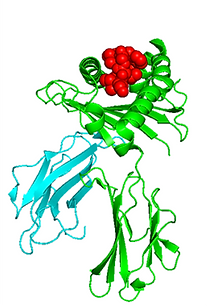Pipeline AIM Biologicals AEZS-150 AEZS-130 (Macimorelin) Macimorelin Dx

Autoimmunity Modifying (AIM) Biologicals
Targeted, highly specific autoimmunity modifying therapeutics for
NMOSD and Parkinson’s
AIM Biologicals (AutoImmunity Modifying Biologicals) utilize a novel mechanism where peptide antigens presented on immunosuppressive MHC class I molecules are designed to selectively and efficiently induce antigen-specific tolerance. Based on this mechanism, the targeted immunomodulating therapeutics are being designed as optimized soluble molecules with the goal to selectively induce tolerance to various autoantigens.
During pregnancy, the maternal immune system tolerates paternal antigens from the embryo but is still effective to protect mother and embryo from foreign antigens. Parts of the natural mechanisms responsible for this feto-maternal immune tolerance form the scientific basis for the concept of AIM Biologicals.
Differentiated Approach to Autoimmune Diseases
-
Innovative platform technology enabling antigen-specific tolerization in auto-immune disease
-
Leverages natural processes that take place during pregnancy which protect the fetus
-
Autoimmune Diseases usually improve during pregnancy
-
-
No suppression of immune response to pathogens or early cancer stages
-
Excellent tolerability expected

Mechanism of Action

-
Due to 50% paternal proteins, a fetus is a semi-allograft for the maternal immune system
-
Still, fetal cells are tolerated by the mother´s immune system
-
AIM Biologicals resemble naturally occurring immune-molecules expressed during pregnancy
-
Platform technology can be adapted to different diseases by antigen selection
Selective Treatment Option for Neuromyelitis Optica Spectrum Disorder (NMOSD)
-
Rare autoimmune disorder leading rapidly to blindness, paralysis and even death if left untreated
-
Inflammatory lesions of the optic nerve(s), spinal cord and brain
-
Affects ~30,000 people in the US¹
-
Expected to be $2.5 billion market by 2028
1. ACTRIMS 2023: NMOSD 3 times more common in women than men in US | ACTRIMS 2023: Black women have highest rate of NMOSD in US | Neuromyelitis News
Demonstrated Efficacy in Preclinical Models
Spontaneous 2D2 Optic Neuritis Mouse Model

Treatment of Parkinson's Disease
-
Progressive neurodegenerative autoimmune disease affecting the central nervous system
-
Primarily impacts the motor system, causing a wide range of physical and non-motor symptoms
-
Affects 9 million people worldwide
-
Affects ~1.5 million people in the US
-
Current treatment market of $4.28 billion
Demonstrated Improvements in Preclinical Parkinson’s Disease Model
Significant induction of regulatory T cells, improvement in motor function and rescue of substantia nigra neurons
